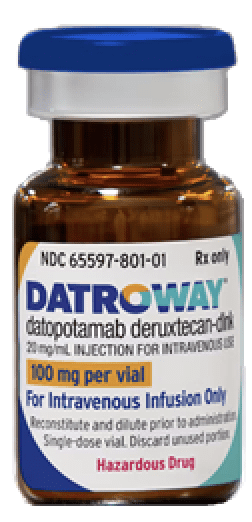Datroway Disease Interactions
There are 4 disease interactions with Datroway (datopotamab deruxtecan).
Datopotamab deruxtecan (applies to Datroway) liver disease
Moderate Potential Hazard, Moderate plausibility.
The recommended dosage of datopotamab deruxtecan has not been established for patients with severe liver dysfunction (total bilirubin greater than 3 times the upper limit of normal [3 x ULN] and any AST). Limited data are available in patients with moderate liver dysfunction (total bilirubin greater than 1.5 to 3 x ULN and any AST); these patients should be monitored for increased adverse reactions. No dosage adjustment is recommended in patients with mild liver dysfunction (total bilirubin up to 1 x ULN and AST greater than ULN or total bilirubin greater than 1 to 1.5 x ULN and any AST).
Datopotamab deruxtecan (applies to Datroway) ocular disease
Moderate Potential Hazard, Moderate plausibility. Applicable conditions: Visual Defect/Disturbance
Datopotamab deruxtecan can cause ocular adverse reactions (including dry eye, keratitis, blepharitis, meibomian gland dysfunction, increased lacrimation, conjunctivitis, and blurred vision). The clinical trial excluded patients with clinically significant corneal disease. Patients should be referred promptly to an eye care professional for any new or worsening ocular adverse reactions. Patients should be advised to avoid using contact lenses unless directed by an eye care professional.
Datopotamab deruxtecan (applies to Datroway) pulmonary impairment
Moderate Potential Hazard, Moderate plausibility.
Datopotamab deruxtecan can cause severe, life-threatening, or fatal interstitial lung disease (ILD) or pneumonitis. The clinical trial excluded patients with history of ILD/pneumonitis requiring treatment with steroids or for ongoing ILD/pneumonitis. Patients should be monitored for new or worsening respiratory symptoms indicative of ILD/pneumonitis during treatment with datopotamab deruxtecan.
Datopotamab deruxtecan (applies to Datroway) renal dysfunction
Moderate Potential Hazard, Moderate plausibility.
The effect of severe renal dysfunction (CrCl less than 30 mL/min) on the pharmacokinetics of datopotamab deruxtecan is unknown. No dosage adjustment is recommended in patients with mild to moderate renal dysfunction (CrCl 30 to less than 90 mL/min); a higher incidence of interstitial lung disease/pneumonitis has been observed in these patients. Patients with renal dysfunction should be monitored for increased adverse reactions (including respiratory reactions).
Switch to professional interaction data
Datroway drug interactions
There are 22 drug interactions with Datroway (datopotamab deruxtecan).
More about Datroway (datopotamab deruxtecan)
- Datroway consumer information
- Check interactions
- Compare alternatives
- Pricing & coupons
- Drug images
- Side effects
- Dosage information
- During pregnancy
- FDA approval history
- Drug class: miscellaneous antineoplastics
- Breastfeeding
- En español
Related treatment guides
Drug Interaction Classification
| Highly clinically significant. Avoid combinations; the risk of the interaction outweighs the benefit. | |
| Moderately clinically significant. Usually avoid combinations; use it only under special circumstances. | |
| Minimally clinically significant. Minimize risk; assess risk and consider an alternative drug, take steps to circumvent the interaction risk and/or institute a monitoring plan. | |
| No interaction information available. |
See also:
Further information
Always consult your healthcare provider to ensure the information displayed on this page applies to your personal circumstances.


